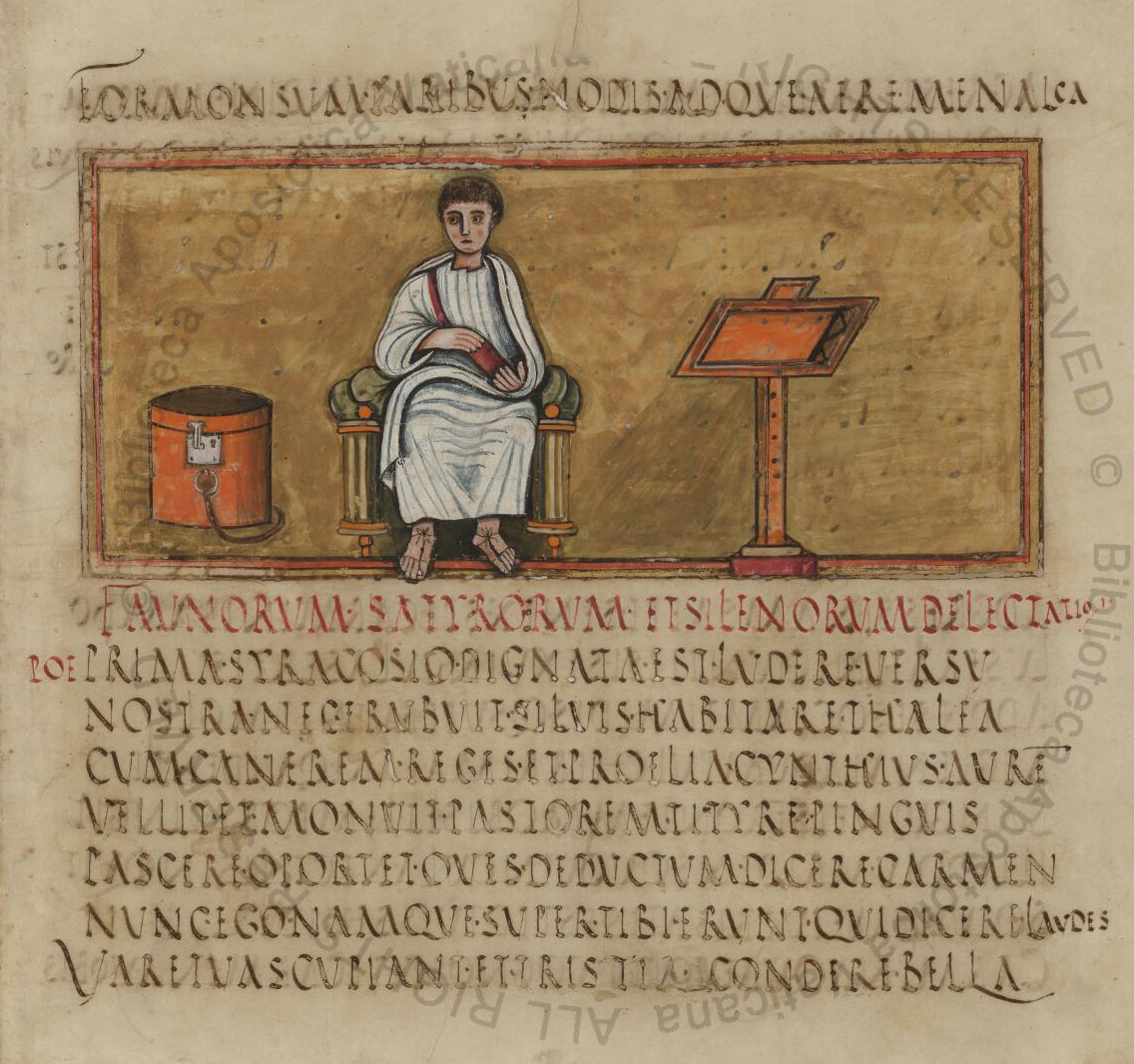|
Chapter
|
Part of Speech
|
Latin
|
English
|
|
1
|
verb (1)
|
laudō, laudāre, laudāvī, laudātum
|
to praise
|
|
1
|
verb (2)
|
moneō, monēre, monuī, monitum
|
to remind, advise, warn
|
|
8
|
verb (3)
|
agō, agere, ēgī, actum
|
to drive, lead, do, act; pass,
spend (time); gratiās agere: to give
thanks)
|
|
10
|
verb (4)
|
audiō, audīre, audīvī, audītum
|
to hear, listen to
|
|
9
|
noun (2)
|
locus, -ī (m.)
|
place; passage in literature (loca,
-ōrum, n.: places, regions)
|
|
9
|
pronoun
|
hic, haec, hoc
|
this; the latter; he, she, it, they
|
|
9
|
pronoun
|
ille, illa, illud
|
that; the former; the famous; he,
she, it, they
|
|
9
|
pronoun
|
iste, ista, istud
|
that over there, that; such
(sometimes with contemptuous force)
|
|
9
|
adjective
|
alius, alia, aliud
|
other, another (aliī...aliī:
some...others)
|
|
9
|
adjective
|
nūllus, -a, -um
|
not any, no, none
|
|
9
|
adjective
|
ūllus, -a, -um
|
any
|
|
9
|
adjective
|
sōlus, -a, -um
|
alone, only, the only
|
|
9
|
adjective
|
totus, -a, -um
|
whole, entire
|
|
9
|
preposition
|
in (+ acc.)
|
into, toward; against
|
|
10
|
noun (1)
|
hōra, -ae (f.)
|
hour, time
|
|
10
|
noun (1)
|
nātūra, -ae (f.)
|
nature
|
|
10
|
noun (3)
|
timor, timoris (m.)
|
fear
|
|
10
|
adjective
|
beātus, -a, -um
|
happy, fortunate, blessed
|
|
10
|
preposition
|
cum (+ abl.)
|
with
|
|
10
|
verb (3)
|
dīcō, dīcere, dīxī, dictum
|
to say, tell, speak; name, call
|
|
10
|
verb (3i)
|
faciō, facere, fēcī, factum
|
to make, do, accomplish
|
|
10
|
verb (3i)
|
fugiō, fugere, fūgī, ——
|
to flee, hurry away; go into exile;
avoid, shun
|
|
10
|
verb (4)
|
veniō, venīre, vēnī, ventum
|
to come
|
|
10
|
verb (4)
|
inveniō, invenīre, invēnī,
inventum
|
to come upon, find
|
|
11
|
noun (3)
|
caput, capitis (n.)
|
head; leader; beginning; life;
heading; chapter
|
|
11
|
noun (3)
|
nēmō, neminis (m./f.)
|
no one, nobody
|
|
11
|
pronoun
|
ego, meī
|
I
|
|
11
|
pronoun
|
tū, tuī
|
you
|
|
11
|
pronoun
|
is, ea, id
|
this, that; he, she, it
(demonstrative)
|
|
11
|
conjunction
|
quod
|
because
|
|
11
|
adverb
|
bene
|
well, satisfactorily, quite
|
|
11
|
verb (3)
|
intellegō, intellegere,
intellexī, intellectum
|
to understand
|
|
11
|
verb (3)
|
mittō, mittere, mīsī, missum
|
to send, let go
|
|
11
|
verb (4)
|
sentiō, sentīre, sēnsī, sēnsum
|
to feel, perceive, think,
experience
|
|
12
|
noun (2)
|
annus, -ī (m.)
|
year
|
|
12
|
noun (3)
|
mater, matris (f.)
|
mother
|
|
12
|
noun (2)
noun (1)
|
medicus, -ī (m.)
medica, -ae (f.)
|
doctor, medic, physician
|
|
12
|
noun (3)
|
pater, patris (m.)
|
father
|
|
12
|
noun (2)
|
principium, -iī (m.)
|
beginning
|
|
12
|
adjective
|
acerbus, -a, -um
|
harsh, bitter, grievous
|
|
12
|
preposition
|
prō (+ abl.)
|
in front of, before, on behalf of,
for the sake of, in return for, instead of, for,
as
|
|
12
|
adverb
|
diū
|
for a long time
|
|
12
|
verb (3)
|
āmittō, āmittere, āmīsī, āmissum
|
to lose, let go
|
|
12
|
verb (3)
|
cadō, cadere, cecidī, cāsum
|
to fall
|








